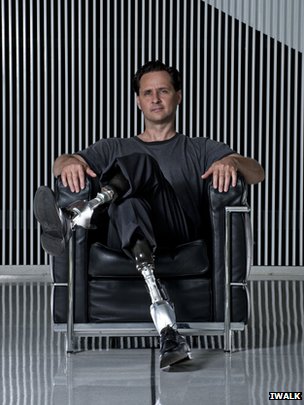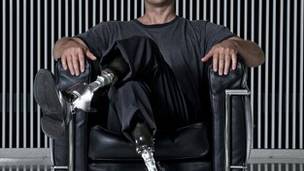Bionic revolution: The tech getting disabled people into work
Source: bbc.co.uk
In a job market that is tougher than it has been for a generation, millions are struggling to find - and keep - work. But while huge swathes of society deal with overcoming cutbacks, closing businesses and forced redundancies, another group of job seekers really does have its work cut out.
But while huge swathes of society deal with overcoming cutbacks, closing businesses and forced redundancies, another group of job seekers really does have its work cut out.Even after a summer of extraordinary Paralympic achievement, people with disabilities face even greater hurdles into employment - access and mobility, coupled often with prejudice and ignorance.
Many believe technology can go some way to addressing this. But it’s a complex journey, with many crossroads, and one that’s far from finished.
At its cutting edge, is Hugh Herr, an associate professor of biometrics at MIT Media Lab.
He believes his pioneering technology - known as bionics - has the ability to tap into a under appreciated workforce who, until now, may have been unable to work.
"I predict a bionics revolution," he says.
"We’re entering a bionic era where we actually are beginning to see technology that’s sophisticated enough to emulate key physiological functions."
He speaks with conviction, and for good reason. As the chief technologist of iWalk, he deals with bionics - or, in plainer English, robotic limbs - on a daily basis.
Not only this, but he is the embodiment of the revolution he believes in. During an ill-fated climbing expedition in 1982, severe frostbite led to Mr Herr having both legs amputated below the knee.
Now, thanks to his own products, he is still able to be a climber.
His bionics are so advanced they not only match the functions of a normal human leg, but are in many ways superior - and they are now commercially available, available from other 50 centres across the United States.
One iWalk customer, a factory worker from Ohio, was able to return to work just two weeks after having his new legs fitted - a process that Mr Herr says can be extremely effective if emulated.
"We can get people back to work, which is huge. That alone would cost the state millions of dollars.
"Furthermore, we can reduce or eliminate payments.
"A co-morbidity of limping is often back pain and joint pain - especially later in life. We’ve had patients that have cut their pain meds in half, or three-quarters - very large amounts."
Removing stigmas
Getting back to work is one thing, but for some, getting into work in the first place can be a struggle.
Barbara Otto is chief executive of Think Beyond The Label, a US non-profit organisation that aims to help businesses overcome a key problem when hiring disabled people: sheer confusion.
"Most businesses who we worked with told us that it was so complicated to find all the relevant facts, all the relevant forms they needed to file to take advantage of all of the great hiring incentives for workers with disabilities," she says.
To combat this, they created a digital hub for both employees and employers to connect. A social network, in many ways, which ties related skills with the needs of businesses - running online career fairs to maximise the networking potential.
In doing so, Think Beyond The Label removes many of the stigmas that can often keep disabled people distant from the workforce.
"The greatest thing about these online career fairs is that it doesn’t require businesses to travel, and it doesn’t require people with disabilities to travel to a space.
"So it breaks down any kind of inhibitions an employer might have, or a person with a disability might have for that matter, in connecting with employment."
A key component, Ms Otto says, is in selling the different perspective an employee with disabilities can bring.
"I always like to say, if you want to hire someone who thinks outside of the box, then hire a person with a disability - because they have to live outside of the box.
"Their day-to-day experiences inform some of their innovation.
"We often find as we’re looking for innovation in either design of technology or usability of software, people with disabilities are really able to provide that sort of missing innovation because of their day-to-day experience of having to innovate."
[...]
Read the full article at: bbc.co.uk






















